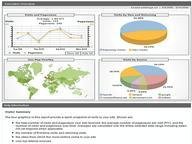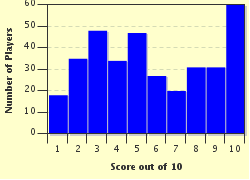Quiz Answer Key and Fun Facts
1. Two six-sided dice are rolled. Find the probability the first die came up a 2 and the second die came up a 5.
2. Two six-sided dice are rolled. Find the probability that one die came up a 2 and the other came up a 6.
3. Two six-sided dice are rolled. Find the probability that at least one die is a 3.
4. Two six-sided dice are rolled. Find the probability that the sum is 8.
5. Two six-sided dice are rolled. Find the probability that the sum is 8 given that the first die was 3.
6. Two six-sided dice are rolled. Find the probability that the first die came up 3 given that the dice sum to 8.
7. Two six-sided dice are rolled. Find the probability that their sum is not 7.
8. Two six-sided dice are rolled. Find the probability that their sum is not 8, given that their sum is not 7.
9. Two six-sided dice are rolled. Find the probability that the first die is not a 5, given that the second die is not a 2.
10. Two six-sided dice are rolled. But this time, the dice aren't fair: For each die, a 1 is twice as likely to be rolled as a 2, a 2 is twice as likely to be rolled as a 3, ..., and a 5 is twice as likely to be rolled as a 6 (in other words, each number is twice as likely as the number that follows it). So what is the probability of rolling a sum of 7?
Source: Author
rodney_indy
This quiz was reviewed by FunTrivia editor
crisw before going online.
Any errors found in FunTrivia content are routinely corrected through our feedback system.


